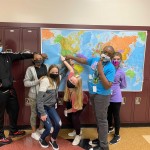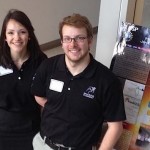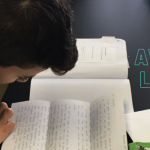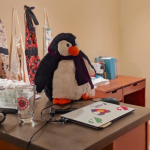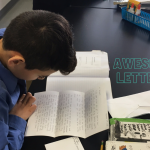This blog post is an extension to the annotated letter series to highlight engaging electronic letters. The goal of this blog series is to provide STEM pen pals with inspiration and ideas from real letters written by STEM professionals. Some STEM professionals have found it difficult to create engaging electronic letters for pre-scientists learning at home. We hope this addition to our series serves as a resource for pen pals to make electronic letters accessible and engaging for pre-scientists.
The following letters are from this school year, 2020-21, written for pre-scientists who are participating in the program remotely. Click on the letter images below to enlarge and read the full letter and annotations.

Author: Samantha Assad, a biochemistry undergrad student in Riverside, California.
Letter highlights:
- Use fun borders and colors to grab pre-scientist attention and customize electronic letter
- Add relevant ‘eye-candy’ like photos, images and diagrams
- Include clear, student-friendly explanations of ideas and concepts

Author: Ana Christina Corona, a biomedical engineering undergrad student in Nuevo León, México.
Letter highlights:
- Use maps to show hometown or place of work
- Teach pre-scientist about your culture like sharing words or phrases in different languages
- Add hand drawn text to make letters feel more customized and personalized

Author: Liz Hunter, a biologist in Washington, D.C.
Letter highlights:
- Refer to your pre-scientist letter to continue dialogue and foster deeper connection
- Share accessible, at-home experiments
- Add photos from workplace to help pre-scientists visualize research

Author: Adriana Padilla, a neuroscience graduate student in San Francisco, California.
Letter highlights:
- Find ways to connect STEM with other subjects
- Use different colored text and bolding to emphasize certain parts of letter
- Add hand drawn text to make letters feel more customized and personalized

Author: Lindsay Blank, a research meteorologist in Longmont, Colorado.
Letter highlights:
- Add images to break up text
- Ask pre-scientist questions
- Add links to encourage pre-scientist to learn more about an element in letter

Author: James Mason, a research scientist for NASA in Boulder, Colorado.
Letter highlights:
- Add clickable links to encourage pre-scientist to learn more
- Engage pre-scientist with photos- for example: spot the difference
- Include fun facts about aspects of work or project

